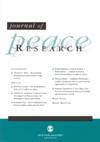This article investigates sexual violence committed by government security forces. It focuses on the issue of delegation. It uses principal—agent logic to understand sexual violence committed by these forces and to set up a cross-national empirical analysis. The article provides an approach to measuring the amount of agent discretion in a political system and an analysis of new cross-national data on the incidence of rape and sexual violence committed by police and security forces. It is argued that sexual violence is a category of human rights violation that is more likely to be attributable to the selfish motivations of agents, and it is an act that is likely to be hidden. This article identifies the conditions under which these acts are most likely to occur as conditions of conflict, system-wide slack bureaucratic control, and where there are constraints on information and organization. The theoretical argument makes sense of earlier findings in the human rights literature, such as the importance of democracy and conflict, while directing attention to motivations, accountability, and, for the first time in systematic analyses of human rights, to the particular issue of sexual violence. The use of cross-national data on the incidence of sexual violence for the year 2003 provides preliminary support for the theoretical argument. After controlling for factors likely to increase the incidence of sexual violence, such as military size and ethnic fractionalization, it is found that, where agents are more accountable and subject to tighter control, sexual violence is less likely. Finally, the article points to the importance of additional data collection over time, consistent with other human rights and conflict datasets, and draws out some policy implications following from the theoretical argument and analysis. "Runner-up Article of the Year," Journal of Peace Research
Butler, Christopher K.; Neil J. Mitchell & Tali Gluch (2007) Security Forces and Sexual Violence: A Cross-National Analysis of a Principal-Agent Argument, *Journal of Peace Research * 44 (6): 669–987.







